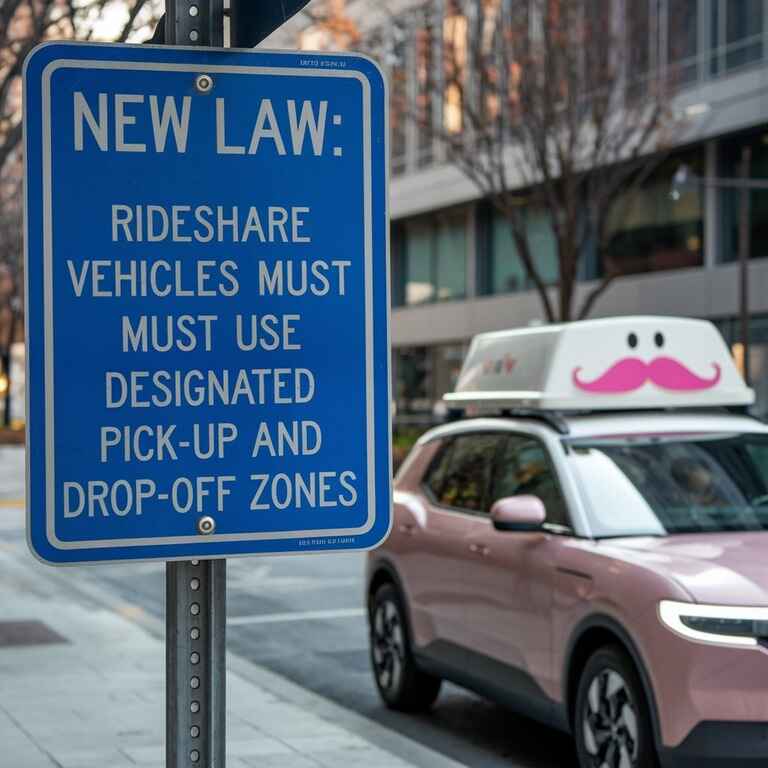Ridesharing services like Uber and Lyft have transformed transportation across Nevada, offering convenient and affordable travel options. However, the operation of these services is governed by specific laws to ensure safety, fairness, and accountability for drivers, passengers, and rideshare companies. Understanding Nevada rideshare laws is crucial for anyone who drives or uses these services.
This article provides an in-depth guide to Nevada’s rideshare regulations, covering everything from licensing requirements to passenger rights and insurance policies.
 Understanding Rideshare Regulations in Nevada
Understanding Rideshare Regulations in Nevada
Definition of a Rideshare Service in Nevada
Rideshare services, also known as Transportation Network Companies (TNCs), connect passengers with drivers using a mobile app. Unlike traditional taxi services, rideshare drivers use personal vehicles and are considered independent contractors rather than employees.
Key Differences Between Rideshares and Taxis
| Feature | Rideshare | Taxi |
|---|---|---|
| Vehicle Ownership | Personal vehicle | Commercial fleet vehicle |
| Dispatch System | App-based booking | Call or hail on the street |
| Pricing | Dynamic (surge pricing) | Fixed rates regulated by meters |
| Licensing | Individual driver approval | Company-level licensing |
Licensing Requirements for Rideshare Companies
Rideshare companies operating in Nevada must comply with state and local regulations enforced by the Nevada Transportation Authority (NTA).
Key Licensing Requirements
- Obtain a Nevada Transportation Network Company permit.
- Conduct regular audits to ensure driver compliance with background checks and vehicle inspections.
- Pay annual fees based on the company’s operational scale.
Failure to comply with licensing requirements can result in fines or the suspension of operating permits.
Driver Requirements Under Nevada Rideshare Laws
Eligibility Criteria for Rideshare Drivers
To legally operate as a rideshare driver in Nevada, individuals must meet specific eligibility requirements:
- Age and Licensing: Drivers must be at least 21 and have a valid Nevada driver’s license.
- Background Check: Drivers must pass a thorough background check conducted by the rideshare company, including criminal history and driving record reviews.
- Vehicle Requirements: Vehicles must undergo an annual inspection and meet safety standards established by the NTA.
Disqualifications for Drivers
- Felony convictions within the past seven years.
- DUI convictions or excessive traffic violations.
- Inadequate vehicle safety standards or missing inspections.
Insurance Coverage for Rideshare Drivers
Nevada law requires rideshare drivers to carry specific insurance coverage depending on their status during a ride.
Insurance Coverage by Ride Status
| Status | Coverage Provided by Driver | Coverage Provided by Company |
|---|---|---|
| App is off | Personal auto insurance | None |
| App is on, no ride accepted | Contingent liability insurance | $50,000 per person, $100,000 per accident, $25,000 property damage |
| En route to pick up a passenger | Commercial liability insurance | $1 million |
| Passenger in the vehicle | Commercial liability insurance | $1 million |
Drivers must also inform their personal insurance providers about rideshare activity to avoid coverage disputes.

Compliance with Traffic and Safety Laws
Adherence to State and Local Traffic Laws
Rideshare drivers in Nevada must follow all traffic laws like any other motorist. This includes:
- Obeying speed limits and traffic signals.
- Using proper turn signals and lane changes.
- Yielding the right of way when required.
Prohibition on Handheld Devices While Driving
Nevada law prohibits rideshare drivers from using handheld mobile devices while operating their vehicles to reduce distractions. Drivers must:
- Use hands-free technology for navigation and communication.
- Avoid texting or manually operating the rideshare app while driving.
Non-compliance can result in fines or suspension from the rideshare platform.
Passenger Rights and Responsibilities
Rights of Rideshare Passengers
Passengers using rideshare services in Nevada are entitled to several protections, including:
- Right to a Safe Ride: Drivers must adhere to all safety regulations, including proper vehicle maintenance.
- Non-Discrimination Policies: Rideshare companies must ensure that passengers are treated fairly, regardless of race, gender, religion, or other characteristics.
- Privacy Protections: Drivers are prohibited from sharing personal passenger information obtained through the app.
Responsibilities of Rideshare Passengers
Passengers also have responsibilities to ensure a positive experience for both themselves and drivers:
- Proper Use of the App: Passengers must use the rideshare app correctly, including entering accurate pickup and drop-off locations.
- Respectful Behavior: Passengers are expected to treat drivers and their vehicles respectfully, refraining from disruptive or damaging actions.
- Reporting Incidents: Any unsafe or inappropriate behavior by drivers should be reported to the rideshare company immediately.
Insurance and Liability in Rideshare Accidents
Rideshare Company Insurance Policies
Nevada law requires rideshare companies to provide insurance coverage for drivers and passengers in case of an accident. This coverage includes:
- Up to $1 million in liability insurance while passengers are in the vehicle.
- Contingent liability coverage when drivers are waiting for a ride request.
Steps to Take After a Rideshare Accident
In the event of an accident involving a rideshare vehicle, the following steps are recommended:
- Contact Authorities: Call the police to report the accident and request emergency assistance.
- Document the Scene: Take photos, record witness statements, and gather contact information for everyone involved.
- Report to the Rideshare Company: Use the app to report the accident and provide all necessary details.
Determining Liability in Rideshare Accidents
Liability in a rideshare accident can vary based on the circumstances:
- Driver Fault: The company’s insurance policy typically covers damages if the rideshare driver is at fault.
- Third-Party Fault: If another driver is responsible, their insurance policy may be liable for compensation.
- Comparative Negligence: Nevada’s comparative negligence law may reduce compensation if multiple parties share fault for the accident.

Special Rules for Rideshare Drivers in Las Vegas
Regulations Unique to Las Vegas
Las Vegas has additional regulations for rideshare drivers due to its high tourism volume and unique traffic patterns:
- Restrictions on the Strip: Drivers must use designated pickup and drop-off zones along the Las Vegas Strip. Stopping in non-designated areas can result in fines.
- Significant Event Restrictions: During concerts and conventions, rideshare companies may impose temporary rules to manage increased demand and traffic congestion.
Picking Up and Dropping Off Passengers at Airports
Las Vegas’s Harry Reid International Airport (formerly McCarran International Airport) has specific guidelines for rideshare operations:
- Permitted Areas: Drivers must pick up and drop off passengers in designated rideshare zones at the airport. These areas are marked and separate from taxi zones.
- Driver Permits: Drivers must have an airport-issued permit or comply with the airport’s rideshare program requirements.
- App Confirmation: Rideshare drivers must confirm passenger rides through the app before entering the airport property.
Failure to comply with these rules can lead to penalties or suspension from the rideshare platform.
Legal Consequences for Violating Nevada Rideshare Laws
Penalties for Drivers
Rideshare drivers who fail to comply with Nevada’s laws face a range of consequences, such as:
- Fines: Monetary penalties for violations like operating without insurance or ignoring traffic laws.
- License Suspension: Repeated offenses or serious violations may result in the suspension or revocation of the driver’s license.
- Deactivation from Platform: Rideshare companies can suspend or permanently deactivate drivers for failing to adhere to their policies or Nevada laws.
Penalties for Rideshare Companies
Rideshare companies are also held accountable for ensuring compliance with Nevada regulations:
- Fines for Non-Compliance: Companies that fail to conduct proper background checks or neglect other regulatory requirements can face significant penalties.
- Operating Permit Suspension: Serious or repeated violations may lead to suspending or revoking the company’s permit to operate in Nevada.

Recent Updates and Changes to Nevada Rideshare Laws
Legislative Changes in the Past Year
Nevada periodically updates its rideshare laws to address evolving transportation needs and technologies. Recent changes include:
- Enhanced Background Checks: New requirements for more thorough driver background checks, including expanded criminal record searches.
- Insurance Adjustments: Increased coverage limits for specific stages of rideshare operations to ensure better protection for passengers and drivers.
Future Trends in Rideshare Regulation
As ridesharing technology evolves, Nevada lawmakers are exploring:
- Integration of Autonomous Vehicles: Preparing legislation for including self-driving rideshare vehicles in the market.
- Environmental Initiatives: Encouraging or mandating rideshare drivers to use electric and hybrid vehicles to reduce emissions.

Breaking It All Down
Nevada rideshare laws are designed to create a safe, fair, and efficient system for drivers and passengers. Understanding these regulations ensures compliance, enhances safety, and protects everyone involved in the rideshare experience. Staying informed about current and future legal developments is essential for navigating the dynamic rideshare landscape in Nevada.

Frequently Asked Questions
Are rideshare services available in rural areas of Nevada?
Rideshare availability depends on the density of drivers in a given area. While urban centers like Las Vegas and Reno have extensive coverage, rural areas may have limited or no access to rideshare services.
Can a rideshare driver refuse service to a passenger?
Yes, a driver can refuse service if a passenger violates company policies, such as being overly intoxicated, posing a safety threat, or attempting to transport prohibited items. However, discrimination based on protected characteristics is not permitted.
What happens if a passenger damages a rideshare vehicle?
The rideshare company may charge passengers who damage a rideshare vehicle a cleaning or damage fee. The specific fee amount depends on the nature and extent of the damage.
Are there any restrictions on what rideshare drivers can transport?
Rideshare drivers are prohibited from transporting unaccompanied minors, hazardous materials, or pets without prior notification (service animals are an exception and must be accommodated).
Do rideshare drivers have to report their earnings for tax purposes?
Rideshare drivers are considered independent contractors and must report their earnings to the IRS. The rideshare company may send drivers a 1099 form summarizing their income.
Can passengers bring alcohol into a rideshare vehicle?
Passengers can bring alcohol into a rideshare vehicle only if it remains sealed. Open containers are prohibited in compliance with Nevada’s open container laws.
How do rideshare companies handle complaints about drivers?
Complaints about drivers are typically handled through the rideshare company’s app or customer service. Depending on the severity of the issue, complaints may lead to driver warnings, temporary suspensions, or permanent deactivation.
Are there special rules for rideshare services during extreme weather in Nevada?
Rideshare companies may implement surge pricing during extreme weather to incentivize drivers. Drivers and passengers are encouraged to prioritize safety and follow any emergency advisories issued by local authorities.
Can rideshare drivers work for multiple companies at the same time?
Yes, rideshare drivers can work simultaneously for multiple companies, such as Uber and Lyft. Drivers often switch between apps to maximize earnings based on demand.
What is the legal recourse if a rideshare driver is involved in a crime while on duty?
Victims should report the incident to law enforcement immediately. Rideshare companies must cooperate with investigations and may provide ride and driver information to authorities.
How are disputes between rideshare drivers and passengers resolved?
Disputes are typically handled through the rideshare company’s resolution process. This may involve mediation, review of app logs, or, in some cases, escalation to legal action if the matter cannot be resolved internally.
Are rideshare services accessible for people with disabilities?
Yes, rideshare companies are required to accommodate passengers with disabilities. This includes providing service to individuals with service animals and offering wheelchair-accessible rides in certain areas.
Can rideshare drivers decline trips to specific destinations?
Drivers can decline trips for reasons such as safety concerns or route preferences. However, consistently declining trips may impact their rating and standing with the rideshare platform.
What are the rules for tipping rideshare drivers in Nevada?
Tipping is optional but encouraged. Passengers can tip drivers through the app or in cash. Tips are separate from the fare and go directly to the driver.
Do rideshare companies share ride data with the state of Nevada?
Many rideshare platforms allow passengers to schedule rides in advance through their apps. This is particularly useful for airport pickups or early-morning commutes.


Additional Resources for You
Nevada Transportation Authority
For official information on rideshare regulations and licensing in Nevada, visit the Nevada Transportation Authority’s website:
https://nta.nv.gov
Nevada Department of Motor Vehicles (DMV)
Learn about driver requirements, vehicle registration, and insurance guidelines at the Nevada DMV:
https://dmv.nv.gov
Harry Reid International Airport Rideshare Information
Get details on designated rideshare zones and driver requirements for airport pickups and drop-offs:
https://www.harryreidairport.com
Uber and Lyft Nevada Information
For specific company policies, insurance coverage, and Nevada-specific guidelines, check the official rideshare provider pages:
- Uber: https://www.uber.com
- Lyft: https://www.lyft.com
Nevada Revised Statutes (NRS)
Access the full text of Nevada’s rideshare laws under NRS Chapter 706, which covers transportation services:
https://www.leg.state.nv.us/NRS
Federal Trade Commission (FTC) Consumer Protection
Learn about your rights and how to avoid scams related to ridesharing:
National Highway Traffic Safety Administration (NHTSA)
Access tips for safe rideshare practices and learn about national traffic laws:
These resources provide in-depth guidance on Nevada rideshare laws and best practices for drivers and passengers.

Offsite Resources for You
Nevada Department of Motor Vehicles – https://dmvnv.com
Official DMV page with information on vehicle requirements and rideshare regulations in Nevada.Nevada Transportation Authority – https://nta.nv.gov
The state authority that oversees rideshare companies and drivers in Nevada.Nevada Highway Patrol – https://nhp.nv.gov
The Nevada Highway Patrol provides rules on driver conduct and safety.Rideshare Insurance – https://www.rideshareinsurance.com
A resource dedicated to rideshare insurance coverage, especially for Nevada drivers.Uber Newsroom – https://www.uber.com/newsroom
The official Uber Newsroom for updates on laws and regulations affecting rideshare drivers in Nevada.Lyft News – https://www.lyft.com/news
The official Lyft News section, where rideshare-related legal updates and policies are shared.Nevada Bar Association – https://www.nvbar.org
The state bar’s website, offering resources related to legal rights and responsibilities for rideshare drivers and passengers.

A Special Message from Our Lead Attorney, Molly Rosenblum Allen, Esq

Thank you for taking the time to read through these resources. I hope you found the information helpful in understanding Nevada rideshare laws. If you have any questions or need personalized guidance, don’t hesitate to call me and my team at (702) 433-2889. We’re ready to help you get the ball rolling on your situation.





